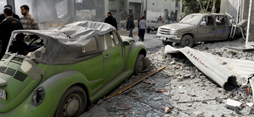

Preventing and Countering Violent Extremism
Rehabilitation and Reintegration of Violent Extremist Offenders in Mali
In August 2016, UNICRI conducted an assessment mission in Mali to present its programme on Rehabilitation & Reintegration of Violent Extremist Offenders (VEOs), developed within the framework of the UN Counter-Terrorism Implementation Task Force (CTITF). The presentation was addressed to key national and international stakeholders and aimed to ensure their engagement. From September 2016 onwards, ICCT and UNICRI joined their efforts in Mali on Reintegration and Rehabilitation (R&R) of violent extremists, providing training to the prison personnel as well as to other relevant actors. The topics addressed in the capacity building and training sessions included the psychological aspects related to violent extremism, the role that religious leaders could play to prevent and counter radicalisation as well as the development of a risk assessment process in the prison settings.
The training workshops have been designed in close consultation with national authorities and international partners, such as the Ministry of Justice and Human Rights and the Justice and Correction Section of the United Nations Multidimensional Integrated Stabilization Mission in Mali (MINUSMA/JCS).
Throughout the needs assessment mission and training workshops, and in consultation with different actors on the ground, ICCT and UNICRI have identified different target areas to be addressed by both national and international actors in order to enhance resilience and counter violent extremism in the Country.
The Mali (Dis-) Engagement and Re-Integration related to Terrorism (MERIT) project builds on the experience of UNICRI in Mali and in the Sahel region.
Mali (Dis-) Engagement and Re-Integration related to Terrorism (MERIT)
Despite several peace accords, the fighting in Mali continues: attacks from terrorist groups are launched on civilians and (inter)national armed forces. The conflict has created a breeding ground for violent extremism and criminal activities, and has resulted in forms of collaboration between terrorist organisations and criminal groups. Local and regional terrorist organisations have engaged in various forms of illicit activities, especially in smuggling and drug trafficking, while criminal groups have been active alongside terror groups in the northern part of the country through trafficking of drugs, weapons and migrants to the Mediterranean. In addition to the dangers posed by these criminal actors, an escalation of intercommunal violence has led to hundreds of deaths and thousands of internally displaced persons. Collectively, these complex threats pose a significant risk to the stability of the Country.
The MERIT project is a multi-year project, spearheaded by the International Centre for Counter-terrorism (ICCT) and by UNICRI with the support of the Royal Danish Embassy in Bamako, Mali. This project is part of a broader effort to prevent and counter violent extremism in Mali. The project targets both the prison environment as well as communities outside to facilitate effective reintegration and to reduce the risk of radicalisation in the larger population, especially among youth. Young people play a key role, as they represent a majority of the Malian population (almost 70% are 24 years or younger) and therefore the future of the country. Their engagement in promoting alternatives to violence is therefore crucial for any counter-terrorism initiative to succeed.
The project is implemented in close collaboration with the Ministry of Justice and Human Rights, the Ministry of Religious Affairs and Faith, the Malian National Prison Administration (DNAPES), MINUSMA and a number of local partners and implementers.
The Project has two main objectives. The first objective is to improve rehabilitation and reintegration of Malian VEOs in and after detention. The second objective is to prevent violent extremism outside the prison context, by promoting alternatives to violence. These objectives are further operationalized across six modules.
Module 1: Risk Assessment
In order to efficiently reintegrate in society, it is essential that authorities have a clear view of the potential risks posed by VEOs and the corresponding avenues for interventions. To this end, the draft risk assessment approach that was created by ICCT and UNICRI in 2017 will be finalised, refined and tested in two Malian prisons.
Module 2: Alternatives to Violence
Previous studies by ICCT have shown how youth in Mali are vulnerable to radicalization, both in and outside of the prison context. To address this issue, a programme will be set up to promote alternatives to violence among youth, by training Malian youth leaders in non-violent discourse and setting up mentoring schemes for them.
Module 3: Monitoring & Evaluation
In this Monitoring and Evaluation module, the effectiveness and impact of the programs' activities will be assessed and reported, leading to a mid-term evaluation report.
Module 4: Research Paper
By collecting primary data in Mali, a study will be conducted during the project. Subject of this research will be the impact of terrorist groups on young people in Mali and the wider region.
Module 5: Youth Engagement
The module of youth empowerment (Module 2) will be followed by youth engagement in promoting social cohesion and peaceful coexistence, in- and outside the prison context. The module envisages the implementation of dialogue sessions in prison, facilitating non-violent political discourse, and training youths to spread the message of non-violence through national and local communication channels.
Module 6: Final Evaluation
The last module incorporates the final evaluation mission and report, assessing the achievements and long-term outcomes of the project.




